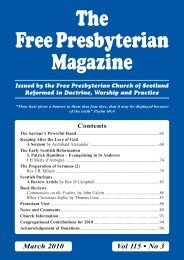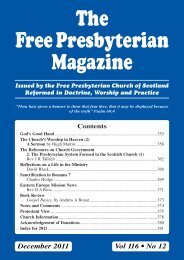May - the Free Presbyterian church of Scotland
May - the Free Presbyterian church of Scotland
May - the Free Presbyterian church of Scotland
Create successful ePaper yourself
Turn your PDF publications into a flip-book with our unique Google optimized e-Paper software.
146<br />
The <strong>Free</strong> <strong>Presbyterian</strong> Magazine<br />
<strong>the</strong> Pope; and in affirming marriage it rejects priestly celibacy and vows<br />
<strong>of</strong> monasticism.<br />
With regard to <strong>the</strong> sacraments it is possibly somewhat Zwinglian – <strong>the</strong><br />
sacraments are signs and tokens but <strong>the</strong>re is no mention <strong>of</strong> <strong>the</strong>ir being seals<br />
– although <strong>the</strong>re is perhaps a hint <strong>of</strong> something more: “And this holy meat<br />
do we use <strong>of</strong>t for this cause, for when through <strong>the</strong> monition and remembrance<br />
<strong>of</strong> it, we behold with <strong>the</strong> eye <strong>of</strong> our faith <strong>the</strong> death and blood <strong>of</strong> Him that<br />
was crucified, and remember our salvation and health, not without a taste <strong>of</strong><br />
heavenly life, and very true feeling <strong>of</strong> eternal life: when we do this we are<br />
wonderfully refreshed through this spiritual, living and eternal food”. Transubstantiation<br />
is certainly rejected; but Wishart went beyond that and maintained<br />
that “<strong>the</strong> ministry <strong>of</strong> <strong>the</strong> mass is <strong>the</strong> mystery <strong>of</strong> iniquity”. Here is a rejection<br />
not only <strong>of</strong> transubstantiation and trusting in <strong>the</strong> mass (as with Hamilton) but<br />
<strong>the</strong> mass itself is now seen as idolatrous, with <strong>the</strong> implication that one should<br />
not even be present. So this undoubtedly requires a separation from <strong>the</strong><br />
Church <strong>of</strong> Rome.<br />
Wishart’s views <strong>of</strong> <strong>the</strong> true Church are (presumably) those set out in <strong>the</strong><br />
Confession. The main mark is <strong>the</strong> faithful preaching <strong>of</strong> <strong>the</strong> Word, to which<br />
is added <strong>the</strong> power <strong>of</strong> <strong>the</strong> keys in Church discipline. The sacraments are<br />
“badges and tokens <strong>of</strong> this society”. So in Wishart we find a clearer view <strong>of</strong><br />
<strong>the</strong> Church, and <strong>of</strong> what was being aimed at, than we have had before.<br />
Fur<strong>the</strong>rmore, he put his ideas into practice in that he was <strong>the</strong> first <strong>of</strong> <strong>the</strong><br />
Scottish Reformers to administer <strong>the</strong> sacrament <strong>of</strong> <strong>the</strong> Lord’s Supper. He did<br />
this, in both kinds, at <strong>the</strong> House <strong>of</strong> Dun in 1544 and again on <strong>the</strong> day <strong>of</strong> his<br />
execution in 1546. It is not recorded that he baptized anybody, but one <strong>of</strong><br />
his followers, Adam Wallace, who was martyred 1550, was charged with<br />
having baptized his own child, which he had done because he rejected <strong>the</strong><br />
baptism <strong>of</strong> <strong>the</strong> Church <strong>of</strong> Rome.<br />
Little family conventicles must have been held since Lollard times, but with<br />
<strong>the</strong> exception <strong>of</strong> Patrick Hamilton’s brief ministry, and <strong>the</strong> parish ministry<br />
<strong>of</strong> Thomas Forret, vicar <strong>of</strong> Dollar, who was martyred in 1539, <strong>the</strong>re does not<br />
seem to have been public preaching until <strong>the</strong> 1540s. The six months <strong>of</strong> Protestantism<br />
led to public preaching in several places (including Aberdeen), so<br />
people were accustomed to this idea by <strong>the</strong> time <strong>of</strong> Wishart. Wishart advanced<br />
beyond this, as we have said, in that he not only preached publicly to mixed<br />
or Protestant congregations but he also administered <strong>the</strong> Lord’s Supper.<br />
Wishart’s prayer at his death was that God would “conserve, defend and<br />
help Thy Congregation, which Thou hast chosen before <strong>the</strong> beginning <strong>of</strong> <strong>the</strong><br />
world”, and this idea <strong>of</strong> “<strong>the</strong> Congregation” marks an important transition.<br />
One o<strong>the</strong>r early Protestant at this time was Henry Balnaves, who was be-

















